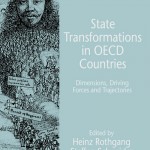The literature on globalization and the democratic nation state is dominated by a crisis diagnosis that holds economic and political internationalization responsible for the waning state capacity in recent decades. However, the causal mechanisms that link internationalization with changing perceptions and evaluations of legitimacy remain underexplored. While there are plausible normative accounts of internationalization effects on the democratic nation state and its legitimacy, empirical perspectives on the link between internationalization and legitimacy are few and far between. Our objective in this chapter is to probe the claim that internationalization has led to an erosion of regime support in the established OECD democracies. The chapter draws on a content analysis of legitimation discourses in the quality press of two EU member states (Germany, United Kingdom) and two non-EU democracies (Switzerland, the United States) over a ten-year period (1998-2007).
We begin by outlining our understanding of legitimacy as an empirical concept within a discourse analytical perspective. Three hypotheses about the effects of internationalization on the legitimacy of the democratic nation state gleaned from the extant literature are then presented, followed by an outline of our research design, text analytical method and data. The main section of the chapter is devoted to our empirical findings. The analysis of legitimation discourses suggests that internationalization has no uniform effect on the ascription or denial of legitimacy in the public spheres of the four examined countries, and hence that it does not foster a general decline of state legitimacy.
- Haunss, Sebastian, Henning Schmidtke, and Steffen Schneider (2015): Internationalization and the Discoursive Legitimation of the Democratic Nation State, in: Heinz Rothgang and Steffen Schneider (eds.), State Transformations in OECD Countries: Dimensions, Driving Forces and Trajectories, Basingstoke: Palgrave Macmillan, pp. 167–186.

